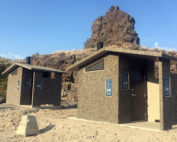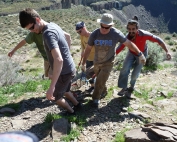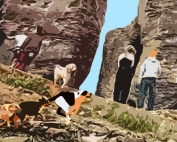Frenchman Coulee is also called “Vantage” by many climbers. There are now over 600 routes at the area, ranging from 5.2 to 5.13, as well as a small amount of bouldering in the bed of the coulee. While many of the routes at Vantage are mediocre crack climbs (due to poor rock), there are a number of classics that make the area well worth a visit. The crags can be very crowded in spring and fall.
Most of the climbing is on two different flows of basalt. The top layer is columnar, usually around 80 feet high. Nearly all the crack routes are on this layer, along with a number of very popular moderate sport routes. The rock tends to fracture in “dinner plates,” creating juggy incut holds on the solid routes and loose choss everywhere else.
The climbing and rock on the lower layer is completely different. Most of it is blocky entablature (sometimes gently overhanging) that features sport routes almost exclusively. Most routes are in the 30 to 40-foot range, with a high concentration of 5.10s and 5.11s. A route’s quality generally depends on how much effort went into cleaning it.
The Washington State Department of Fish and Wildlife (WDFW) administers Frenchman Coulee as part of the Columbia Basin Wildlife Area. WDFW land managers have expressed concerns about impact to fragile soils and plants on top of the cliffs, multiple climbers’ trails, and expansion of the climbing area beyond its current footprint. To address these concerns, both the Access Fund and the Frenchman Coulee Climbers’ Coalition have sponsored work projects to consolidate trails and revegetate eroded areas.
Climbers have been active stewards at Vantage. The area exploded in popularity in the 1990’s and with increased use some areas experienced erosion. In addition, a lack of delineated trails led to unnecessary damage to the vegetation. Like the desert Southwest, there’s a cryptogamic soil crust of lichens and mosses. Climbers have delineated the trails leading to popular crags; please use them. Many of the climbs are equipped with rap anchors just short of the rim to allow lowering without topping off for the same reason.
Climbers have undertaken stewardship projects here over the last 20 years. In addition, the Washington Climbers Coalition, the Access Fund, The Mountaineers, the Spokane Mountaineers, and the American Alpine Club raised money and installed a toilet here in 2014, and we’re working on another one in 2017.
The parking and camping areas can be very crowded. The area’s a popular camping spot for Gorge Amphiteater concertgoers. Crowds and cars have caused severe damage in the camping area between the Feathers and the main parking lot. As a result, the area is largely denuded and is often littered. WDFW is considering blocking this area to cars and allowing walk-in camping only.
Although Frenchman Coulee was first explored in the 1950s, intensive trad and sport development kicked in during the late 1980s. Bolting wars have erupted at times. One climb has been bolted and chopped three times. Sometimes bitter debates have deeply divided some climbers, even if they share a great fondness for the area. Climbers on all sides of these issues should show restraint.
In 2001, controversy developed over climbs on the Winter Walk Wall, an outlying crag on the north side of Frenchman Coulee. This area is on private property and is currently closed. Climbers are urged to respect this closure if there’s to be any chance access might be granted in the future.
Watch for occasional rattlesnakes.
Ownership/Management:
State-owned lands administered by the Washington Department of Fish & Wildlife. Cliffs on north side of Frenchman Coulee are on private property.
Current status:
The Middle East Wall has been closed in prior years for the spring nesting season. We do not know the 2017 status. Winter Walk Wall (on private land; north side of Frenchman Coulee) is closed.
Access considerations:
Camping is restricted to the basin area between the Feathers and the main (Sunshine Wall) parking area. Open fires are prohibited from April 15 -October 15.
The area’s semi-desert (shrub-steppe) vegetation is remarkably sensitive. Please stay on trails.
For years, Fugs Wall has been recognized as a “trad only” area. Please don’t establish sport routes on the Fugs Wall side of Echo Basin.
A Washington State, Discover Pass is required for parking. $30.00 a year or $10.00 a dy. Information about Discover Pass.







